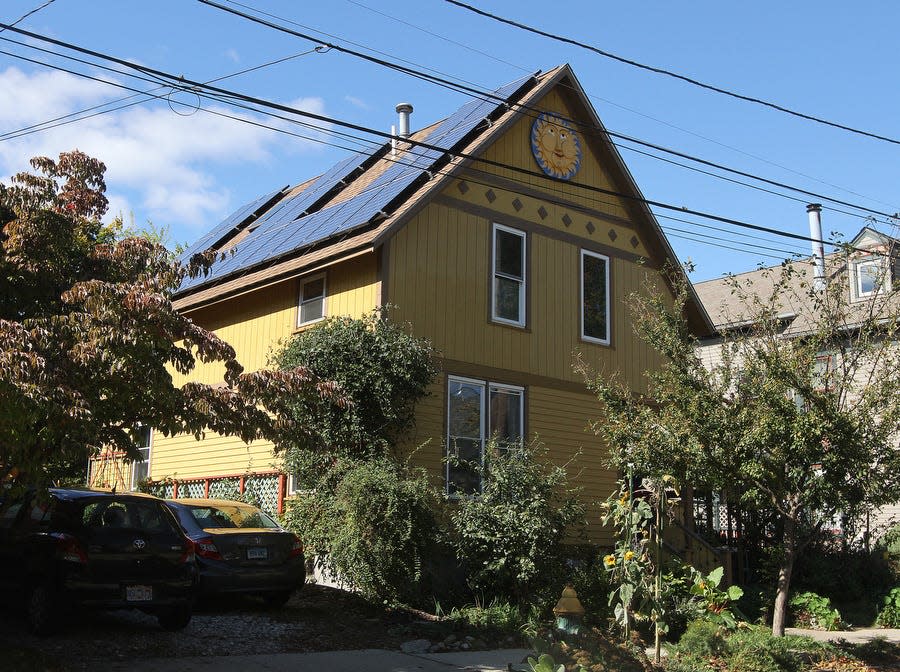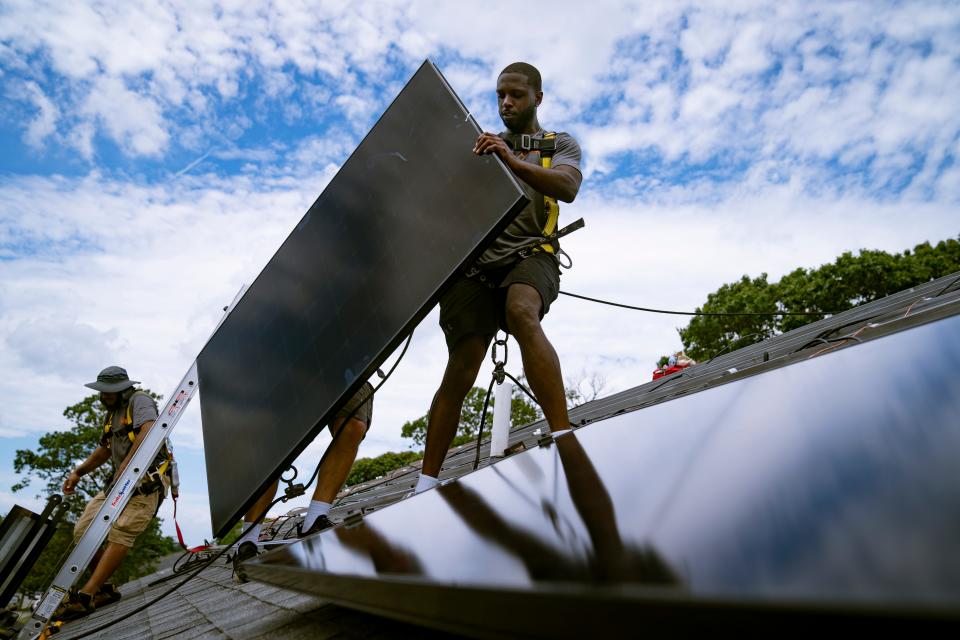New program will help lower income homeowners get solar panels. Here's how it works.
PROVIDENCE — The price of solar panels continues to drop, but they can still be out of reach for many homeowners.
A new state government program in the works in Rhode Island aims to make the installation of rooftop panels that can convert the sun’s energy to electricity more attainable for households that otherwise wouldn’t be able to afford the cost.
Rhode Island is the first state in the nation to begin moving ahead with a program that uses new incentives under last year’s federal Inflation Reduction Act to help low- and moderate-income households invest in renewable energy systems and do their part to reduce planet-warming greenhouse gas emissions.
The progress demonstrates the state’s commitment to expanding access to solar, said Vero Bourg-Meyer, of the Clean Energy States Alliance, a nonprofit that’s helping Rhode Island policymakers develop the program.
“Being first in this context opens the door to innovative thinking, a clear signal to the private sector that Rhode Island is open for business in low- and moderate-income solar,” said Bourg-Meyer, project director for solar and offshore wind at the alliance.
More:How hot is it? Providence's treeless neighborhoods magnify summer heat
How does the program work?
The program, known as Affordable Solar Access Pathways, or ASAP, is modeled on one in Connecticut that was established before President Biden signed the IRA into law last August, bringing with it a host of tax credits and rebates for renewable energy, energy efficiency and electric vehicles.
The key difference with the Connecticut program is that the Rhode Island initiative will allow solar installers to tap into an elevated tax credit that was created by the new federal law, allowing them to pass on greater savings to homeowners. The tax credit is specifically aimed at expanding renewable energy to lower income neighborhoods.

The tax credits will be paired with an additional incentive that will come from Rhode Island’s share of revenues from the Regional Greenhouse Gas Initiative, a cap-and-invest program that requires power plants to pay for carbon emissions. The program is starting out with a $1-million budget under a partnership between Rhode Island Commerce and the state Office of Energy Resources.
More:What to know now, and for the future, about electric cars in Rhode Island
What are the requirements to qualify?
The state released a request for proposals from solar installers in December, so the specifics of the program are still uncertain, including how many homes could get solar panels. But the hope is that it will mirror what was done in Connecticut, where 4,400 solar projects were installed for low- and moderate-income homeowners from 2015 to 2021.
It’s also still unclear what sort of savings participants could see. But if the program is anything like its predecessor in Connecticut, they would be substantial. There, Posigen, the winning bidder, combined energy efficiency upgrades with solar installations and households saw net average savings on their electric bills of $700.
The Rhode Island program is considering a similar approach of also using energy efficiency – which could include anything from better insulation to upgraded lightbulbs – to enhance savings.
“We’re really excited to provide this for these communities,” said Karen Stewart, program manager of the Renewable Energy Fund at Rhode Island Commerce. “It's definitely a feel-good approach to the proliferation of solar, especially as energy costs are going up so steeply.”
Electric bills in Rhode Island and across the Northeast jumped this winter because of inflation and increased global demand for natural gas driven by the war in Ukraine.
Responses to the RFP are due by Feb. 24 and if all goes as planned, the program would be up and running in the spring.

The solar program is targeted at single-family homes located in environmental justice areas, as defined by the state Department of Environmental Management. The areas, which disproportionately suffer the effects of pollution, include parts of Woonsocket, Central Falls, Pawtucket, Providence, Cranston, West Warwick, East Providence, Warren, Middletown and Newport.
Applicants will also have to meet income guidelines. Only households with income less than or equal to 80% of the Rhode Island median will qualify. For a single person, that's $34,039. For a family of four, it’s $65,460.
Those who qualify will not own the solar panels. Instead, they’ll be leasing rooftop space to solar companies that will sell the power to the grid. The homeowners will get payments in return.
Rhode Island has adopted broad policy goals to ramp up the use of renewables and slash carbon emissions. In 2021, Gov. Dan McKee signed into law the Act on Climate, which requires the state to reach net-zero emissions by 2050. The General Assembly followed up last year with legislation that aims to offset all electric usage with offshore wind, solar and other renewable sources by 2033.
Rhode Island has seen huge growth in solar capacity over the past decade, but much of the investment has been made in sprawling ground-mounted arrays in rural areas rather than on rooftops in urban neighborhoods.
The new program would help plug that gap. It’s also aimed at replacing a community solar program that allowed urban homeowners to invest together in some of those big rural projects. Begun in 2019, the program, which required companies to sign up low- and moderate-income homeowners, quickly reached its 30-megawatt capacity and has yet to be expanded.
“This is the next iteration,” said Shauna Beland, administrator of renewable energy programs at the Office of Energy Resources. “We put our heads together to come up with something to promote solar among more homes.”
This article originally appeared on The Providence Journal: New RI program would use tax incentives to help homeowners install solar panels

